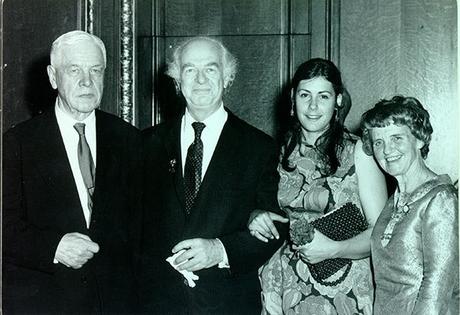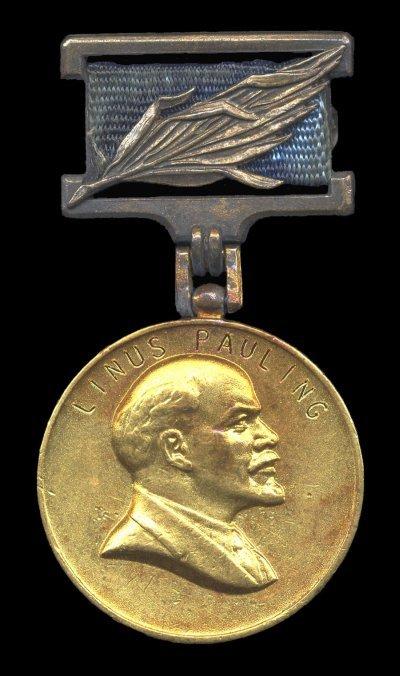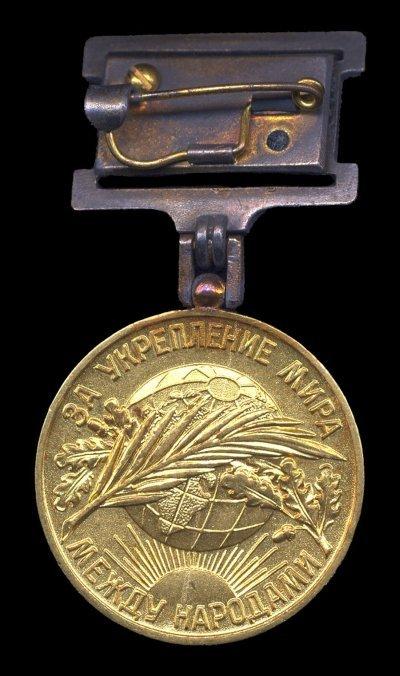 Dmitry Skobeltsyn, Linus Pauling, Marilla [?] and Ava Helen Pauling, Lenin Prize ceremonies, June 15, 1970
Dmitry Skobeltsyn, Linus Pauling, Marilla [?] and Ava Helen Pauling, Lenin Prize ceremonies, June 15, 1970 [Part 1 of 2]
“Now is the time for us to change from our immoral course, from our dedication to the archaic institution of war, to a policy of peace and rationality and morality. I am confident that the Soviet Union would follow our lead, that the conduct of international affairs could be made to find the just solution of international problems, that we can achieve the goal of a world of justice and morality, a world in which the wealth of the world is used for the benefit of human beings, a world of freedom and dignity, a world of which our idealistic young people will be glad to be a part.”
–Concluding remarks of the first draft of Linus Pauling’s acceptance speech, written on the occasion of his receipt of the International Lenin Prize for Strengthening Peace Among Peoples, June 1970
On June 15, 1970, at the Soviet Embassy in Washington, D.C., Linus Pauling gave an acceptance address acknowledging his receipt of the 1968-69 International Lenin Prize for Strengthening Peace Among Peoples. Created in 1949, this award was originally named the International Stalin Prize for Strengthening Peace Among Peoples in honor of then Soviet Premier Joseph Stalin. In 1956, three years after Stalin’s death, the prize was renamed by his successor as premier, Nikita Khrushchev. For most of its history, the prize was awarded annually to non-Soviet citizens who upheld the foundations of world peace. The award was discontinued following the collapse of the Soviet Union in 1991.
For Pauling, receiving the Lenin Prize represented, among other things, an opportunity to leverage attention toward his peace-oriented goals. Perhaps most notably, Pauling’s private correspondence reveals that when he heard that he was to receive the prize, his initial response was that he wanted the ceremony to be held at the United Nations building in New York. In a letter to the Soviet Academy of Sciences, Pauling wrote that he felt that the UN headquarters would be appropriate, “especially at this time, when the world is torn by wars and oppressed by militarism[.] [T]he symbolic significance of the presentation of this Peace Prize in the United Nations Headquarters could be very important.”
In addition to being appropriate on its own merits, Pauling also cited precedent in support of his suggestion. The opening ceremony of the 1965 International Convocation on the Requirements of Peace, he noted, was sponsored by the Center for the Study of Democratic Institutions and held at the UN Headquarters. Mostly for these reasons, Pauling was convinced that the UN Secretary General, U Thant, would approve of his idea.
It is unclear why the ceremony was not held at the UN headquarters, and instead at the Soviet Embassy in Washington, D.C., but what is clear is that the ceremony was celebrated with much fanfare and adulation for Pauling and his accomplishments towards peace.

At the embassy, the Prize was given to Pauling by Soviet physicist and academician Dmitry V. Skobeltsyn, who addressed all in attendance with a warmhearted, “Comrade Ambassador, Dear Mr. and Mrs. Pauling, Ladies and Gentlemen, Dear Friends.” He then detailed the history of the prize, suggesting that it was established to support some of Lenin’s ideals, including his fight for “true brotherhood, equality, and freedom of peoples.” For Skobeltsyn, Pauling was the true embodiment of these ideals as well as an “ardent fighter for peace.”
Skobeltsyn continued that Pauling was receiving the award for his “personal merits in the struggle for peace and the contribution which is being made to the cause of defending peace by the wide movement of the progressive international community, and among them, by progressive circles in the United States.” He then pointed out that “Pauling is widely known in the world…as the name of an outstanding public figure who is ceaselessly struggling to ensure that the achievement of science serve the cause of peace and that the danger of [nuclear weapons’] use in a new destructive world war, which would threaten mankind with incalculable sufferings, be eliminated.”
From there, Skobeltsyn enumerated several of Pauling’s major peace-related accomplishments, including his 1957 petition to the United Nations “calling for an immediate conclusion of an international agreement banning the tests of nuclear bombs,” and his 1961 establishment (with the help of Ava Helen Pauling) of a conference against the spread of nuclear weapons. He concluded his remarks by expressing his hope that “friendly relations between Soviet and American peoples grow stronger and develop in the interest of peace.”
For his part, Pauling regarded the prize to be fitting and even serendipitous, noting that the day he had become aware of the honor in April 1970 was also the same day that the Strategic Arms Limitation Talks between the United States and Soviet Union had begun. Pauling then traced his work in attempting to end the arms race between the Soviet Union and the United States, and stressed that the beginnings of the SALT talks had marked a turning point in the trajectory of this work. For Pauling, it was a moment of optimism; the talks a source of “more hope on cutting down the armament burden than we have had for a long time.”

